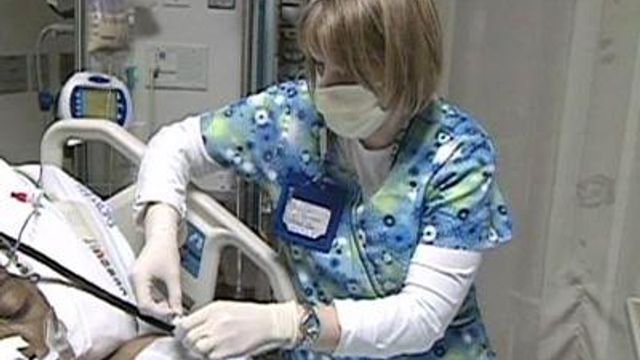Health Team
Study: MRSA infections down
In the past eight years, the risk of MRSA or methycillin-resistant staphylococcus aurea infections in hospital intensive care units has declined, researchers at the Centers for Disease Control and Prevention have found.
Posted — UpdatedIn the past eight years, the risk of MRSA, or methycillin-resistant staphylococcus aurea, infections in hospital intensive care units has declined, researchers at the Centers for Disease Control and Prevention have found.
MRSA is a strain of bacteria resistant to most antibiotics. It can cause serious and costly infections in the blood stream. MRSA can be fatal, according to the Mayo Clinic.
Patients in ICUs have been most at risk for the infection through the use of simple catheters, which are placed in major blood vessels.
“You're placing a device through patient's skin into a sterile body space,” CDC Dr. John Jernigan said.
Over the last 10 years, hospitals have worked harder to avoid MRSA infections.
In a study in the Journal of the American Medical Association, researchers at the CDC analyzed data from almost 600 hospitals between 1997 and 2007 - to see what effects hospital efforts have had among ICU patients.
Up until 2001, the risk of MRSA was still increasing.
“Since 2001, the risk of MRSA blood-stream infections associated with the use of a central line in intensive care units has dramatically declined by roughly 50 to 70 percent in most types of ICUs,” the CDC's Dr. Deron Burton said.
While the study didn't look into the reasons for the decline, researchers found that efforts to improve the safety of central line catheters in ICUs may be working.
“We were thrilled to confirm that these efforts have been paying off and appear to be showing dramatic reductions in MRSA bloodstream infection risk,” Burton said.
Outside of hospitals, MRSA typically first appears as a skin or soft tissue infection. When it occurs in hospitals, it usually starts as a more serious infection in the bloodstream.
• Credits
Copyright 2024 by Capitol Broadcasting Company. All rights reserved. This material may not be published, broadcast, rewritten or redistributed.





